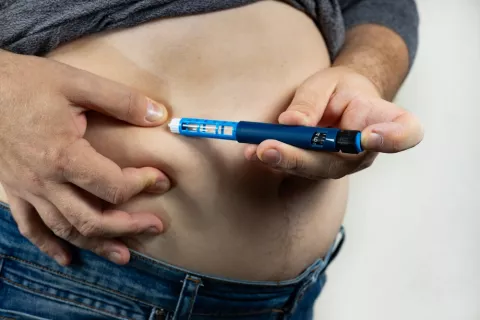A team of scientists has developed a new class of compounds capable of significantly reducing weight and blood glucose levels, similar to what is achieved with gastric bypass surgery, which would make it possible to avoid the serious consequences of obesity. and type 2 diabetes for health; In other words, the same benefits provided by this surgical intervention would be obtained, but without the need to undergo surgery or experience its possible adverse effects, such as dumping syndrome.
Researchers have verified the effectiveness of these experimental treatments in laboratory animals. In addition, the injectable compounds avoid common side effects with current drugs to treat diabetes and overweight, such as nausea and vomiting. The new treatment they have developed, they claim, reduces food intake and increases calorie burning.
The results of the work have been presented at the spring meeting of the American Chemical Society (ACS) ACS Spring 2023. “Obesity and diabetes were the pandemic before the COVID-19 pandemic,” says Robert Doyle, one of the two principal investigators of the project, along with Dr. Christian Roth. “They are a huge problem and they are set to only get worse.”
The weight loss that has occurred with GEP44 treatment can not only be attributed to decreased food intake, but also increased energy expenditure.
Bariatric surgery, which includes gastric bypass, is used in the treatment of obesity, and generally achieves weight loss, and even diabetes remission, but it is not indicated for all patients, it has associated risks , and many obese or diabetic people do not have access to this therapeutic option, so Doyle believes that their metabolic problems could be managed with a medication that provides the same long-term benefits as surgery.
The benefits that occur after this surgery are related to changes in the levels of intestinal secretion of certain hormones, including glucagon-like peptide 1 (GLP-1) and peptide YY (PYY), which induce satiety, decrease the desire to eat and normalize blood sugar levels.
Available drugs that claim to replicate this effect primarily activate cellular receptors for GLP-1 in the pancreas and brain, and have been highly successful in reducing weight and treating type 2 diabetes, but many patients do not. they tolerate the side effects of the drugs, and Doyle states that 80-90% of people who start taking these drugs stop taking them within a year. For this reason, several investigators have designed other treatments that interact with more than one type of intestinal hormone receptor.
Lose weight and control glucose with the same drug
Doyle’s group, for example, has created a peptide that activates two receptors for PYY, as well as the receptor for GLP-1. This compound, which they have named GEP44, made obese rats eat up to 80% less than they would under normal conditions and, at the end of a 16-day study, they had lost an average of 12% of their weight, which It is more than three times the amount lost by rats treated with liraglutide, an injected drug that activates only the GLP-1 receptor and is approved by the FDA (United States Food and Drug Administration) to treat obesity. Unlike liraglutide, tests with GEP44 in rats and shrews (a mammal that, unlike rats, can vomit) showed no signs of nausea or vomiting.
Researchers have found that the weight loss that has occurred with GEP44 treatment can be attributed not only to decreased food intake, but also to increased energy expenditure due to increased mobility, heart rate, or body temperature. Since the half-life in the body of GEP44 is only one hour, these scientists have now engineered a peptide with a much longer half-life, meaning it could be injected only once or twice a week instead of several times a week. day. In addition, rats that have been treated with this new generation compound remain healthier and slimmer, even after finishing treatment.
Peptide treatments also lower blood sugar levels by driving glucose into muscle tissue, where it can be used for fuel, and by converting some cells in the pancreas to insulin-producing cells, helping to replace those that have been depleted. deteriorated due to diabetes. An additional benefit of GEP44 is that in rats it reduces anxiety for opioids, such as fentanyl, so if this finding is replicated in humans it could help treat drug addiction.
The authors of this research have already applied for patents for their compounds and their next goal is to test how their peptides work in primates. They will also study how treatments change gene expression and rewire the brain, and what that might mean for these compounds, as well as other types of drugs.
.









